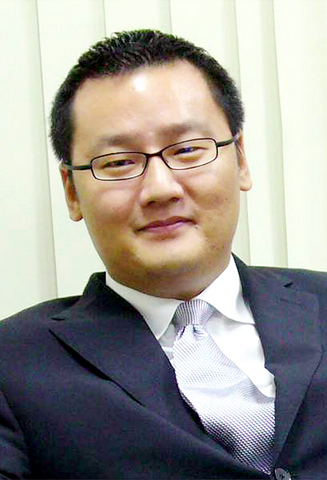At the APEC CEO summit in Hanoi last November, Phu My Hung Corp (富美興) chairman Arthur Ting (丁廣鋐), in his early 30s, lectured to business leaders from 21 member countries on doing business in Vietnam.
The honor is usually reserved for tycoons like Steve Jobs or Bill Gates. What made this rarer was the fact that Ting, as a Taiwanese, was given a chance to enhance Taiwan's profile in the international event, something that is ordinarily blocked by China.
But Ting seems to carry a weight comparable to Jobs and Gates in Vietnam, where Phu My Hung is a household name with its own "urban legend."

PHOTO: JESSIE HO, TAIPEI TIMES
Founded in 1993, Phu My Hung is 70 percent owned by the Taiwan-based Central Trading and Development Group (中央貿易開發關連企業) and 30 percent by the Tan Thuan Industrial Park Development Co that represents the Ho Chi Minh City People's Committee.
Led by Lawrence Ting (丁善理), then chairman of Phu My Hung and Arthur's father, the company started to develop infrastructure and residential and commercial buildings on 3,300 hectares south of downtown Ho Chi Minh City.
But at the time, most of the area was swampland where communist guerillas hid during the Vietnam War.
"When we started the development plan, local people sneered at us and called us crazy," Phu My Hung president Frances Ba (巴大文) said.
The company completed the first batch of Western-style villas in 1998, but plagued by the war-zone stigma, it took a whole year to sell all 14 units priced at US$17,000 each, Ba said.
With the completion of a main road and offering quality living at 30 percent of the price of the main part of the city, Phu My Hung sold out 2,000 apartments in 2000 -- the time when the legend of Phu My Hung turning swamp into gold began to spread.
Now, the Phu My Hung urban area has five zones: new city center, university place, high-tech center and two merchandise centers. Prices of residential apartments have skyrocketed to between US$800 and US$1,200 per square meter, three times more expensive than downtown.
The self-sufficient community has been praised as an urban residential model for Vietnam, and the Central Trading and Development Group became one of the largest and most successful foreign investors in the country.
Phu My Hung's investment totaled US$700 million, and includes the Tan Thuan export processing zone that has attracted 108 companies with trade volume of US$1.3 billion per year, and the Hiep Phuoc power plant that supplies electricity to the area.
The legend will not stop here.
"We will continue to develop the area to accommodate a population of 1 million in the next 10 years," Arthur Ting said.
Targeting Vietnam's business potential after joining the WTO, Phu My Hung is now building an international-scale exhibition hall, which is expected to bring in huge business and the status of a new world trade center, Ting said.

MAKING WAVES: China’s maritime militia could become a nontraditional threat in war, clogging up shipping lanes to prevent US or Japanese intervention, a report said About 1,900 Chinese ships flying flags of convenience and fishing vessels that participated in China’s military exercises around Taiwan last month and in January have been listed for monitoring, Coast Guard Administration (CGA) Deputy Director-General Hsieh Ching-chin (謝慶欽) said yesterday. Following amendments to the Commercial Port Act (商港法) and the Law of Ships (船舶法) last month, the CGA can designate possible berthing areas or deny ports of call for vessels suspected of loitering around areas where undersea cables can be accessed, Oceans Affairs Council Minister Kuan Bi-ling (管碧玲) said. The list of suspected ships, originally 300, had risen to about 1,900 as

DAREDEVIL: Honnold said it had always been a dream of his to climb Taipei 101, while a Netflix producer said the skyscraper was ‘a real icon of this country’ US climber Alex Honnold yesterday took on Taiwan’s tallest building, becoming the first person to scale Taipei 101 without a rope, harness or safety net. Hundreds of spectators gathered at the base of the 101-story skyscraper to watch Honnold, 40, embark on his daredevil feat, which was also broadcast live on Netflix. Dressed in a red T-shirt and yellow custom-made climbing shoes, Honnold swiftly moved up the southeast face of the glass and steel building. At one point, he stepped onto a platform midway up to wave down at fans and onlookers who were taking photos. People watching from inside

Japan’s strategic alliance with the US would collapse if Tokyo were to turn away from a conflict in Taiwan, Japanese Prime Minister Sanae Takaichi said yesterday, but distanced herself from previous comments that suggested a possible military response in such an event. Takaichi expressed her latest views on a nationally broadcast TV program late on Monday, where an opposition party leader criticized her for igniting tensions with China with the earlier remarks. Ties between Japan and China have sunk to the worst level in years after Takaichi said in November that a hypothetical Chinese attack on Taiwan could bring about a Japanese

The WHO ignored early COVID-19 warnings from Taiwan, US Deputy Secretary of Health and Human Services Jim O’Neill said on Friday, as part of justification for Washington withdrawing from the global health body. US Secretary of State Marco Rubio on Thursday said that the US was pulling out of the UN agency, as it failed to fulfill its responsibilities during the COVID-19 pandemic. The WHO “ignored early COVID warnings from Taiwan in 2019 by pretending Taiwan did not exist, O’Neill wrote on X on Friday, Taiwan time. “It ignored rigorous science and promoted lockdowns.” The US will “continue international coordination on infectious